Over 30 years of anarchist writing from Ireland listed under hundreds of topics
Opinion
Theresa May elected but there can be no such thing as a feminist Tory
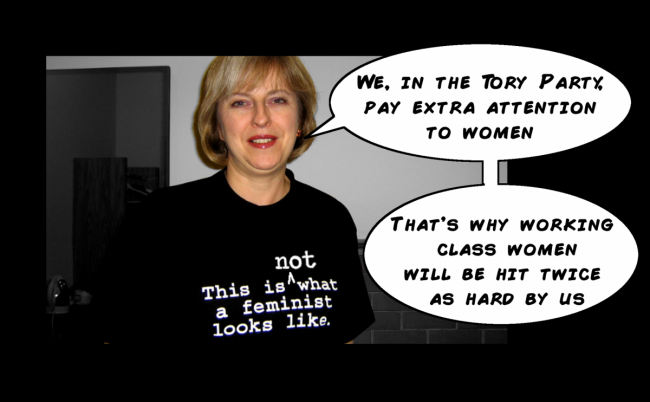 Theresa May has just become the UK’s latest Prime Minister and the second ever woman Prime Minister. She’s certainly a decent orator paired with a comedian of a speech writer who wrote a statement filled with faux concern about making the “UK a country that works for all and not just the privileged few” – it’s as if she thinks we don’t know she’s a member of the privileged-few-loving Conservative Party, or as she reminded us, Conservative and Unionist Party (I’m not sure that’s supposed to make us feel better about the Tories…).
Theresa May has just become the UK’s latest Prime Minister and the second ever woman Prime Minister. She’s certainly a decent orator paired with a comedian of a speech writer who wrote a statement filled with faux concern about making the “UK a country that works for all and not just the privileged few” – it’s as if she thinks we don’t know she’s a member of the privileged-few-loving Conservative Party, or as she reminded us, Conservative and Unionist Party (I’m not sure that’s supposed to make us feel better about the Tories…).
Why we say Black Lives Matter and not All Lives Matter
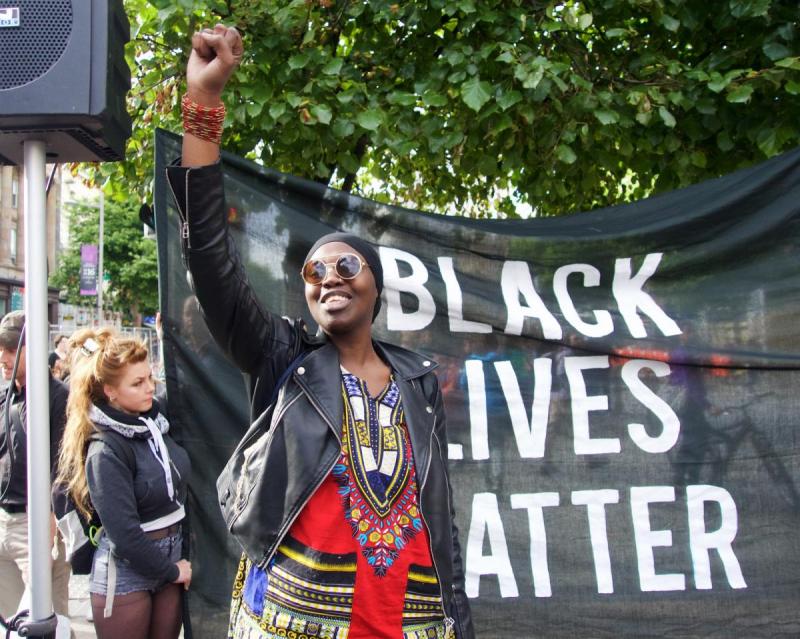 There's a funny glitch in both US and Irish society that whenever 'Black Lives Matter' (BLM) is said, inevitably there's an echo of 'All Lives Matter' (ALM). Like good social technicians let's try and fix that glitch.
There's a funny glitch in both US and Irish society that whenever 'Black Lives Matter' (BLM) is said, inevitably there's an echo of 'All Lives Matter' (ALM). Like good social technicians let's try and fix that glitch.
Black Lives Matter is variously accused of being 'racist', 'divisive', and 'distracting' from what's 'really' happening and 'real' issues. But this is mistaken.
'Black Lives Matter' is not a statement made in a vaccuum, out of nowhere - 'Black Lives Matter' is a response. It's a direct response to every killing of a black person by the police, as agents of the white supremacist state. Every killing, and the subsequent indifference of (white) society and impunity of the killers, is a message: BANG, BANG, 'Black Lives Don't Matter'. 'No' is the reply, 'Black Lives Matter'.
Video documentary on the Belfast Rally for Choice 2016
This year Belfast saw its largest pro-choice demonstration when about a thousand people took to the streets for the Rally for Choice. This was a significant achievement and to mark it we’ve put together this brief documentary featuring footage from the march, some of the speakers and interviews with both organisers and participants.
Wealth and the working poor - you'd have to work 703 years to earn what O'Reilly takes
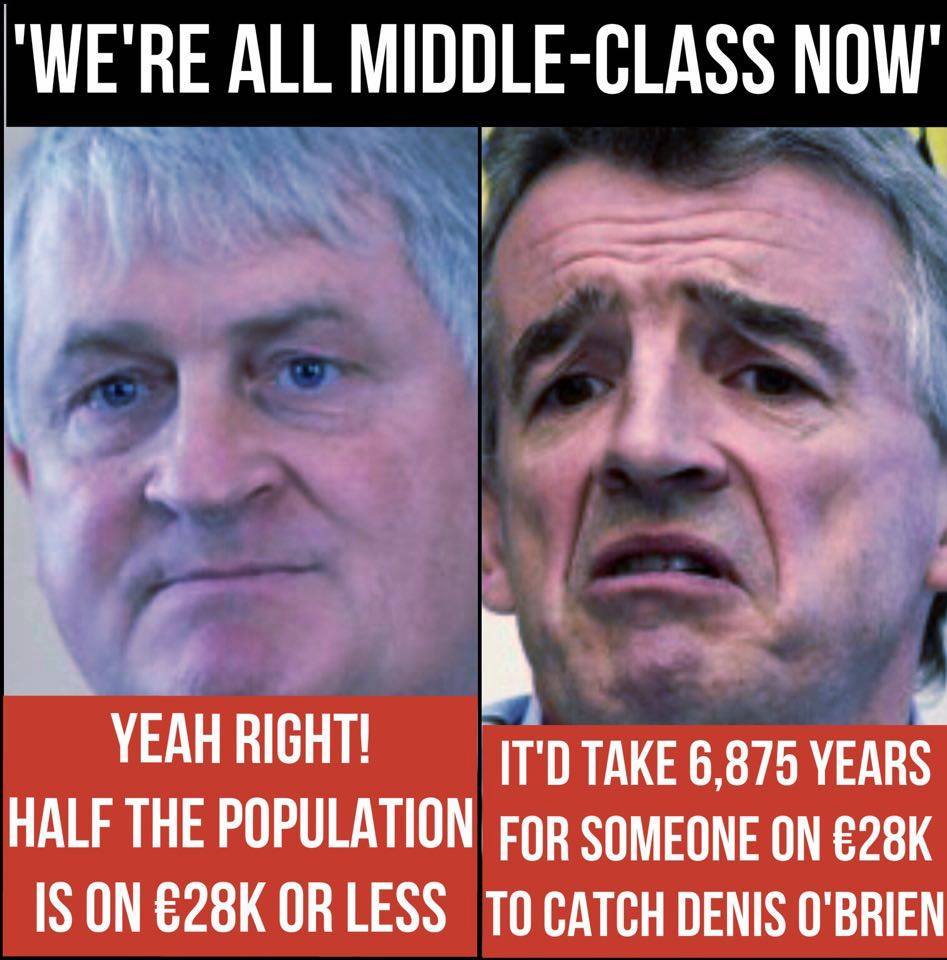 Roughly over one hundred thousand workers in Ireland are currently working on the minimum wage-thats 9.15 an hour or under 400 euro a week,working 40 hours a week. Around 90% of those on social welfare payment and out of work earn less than they would in work. The old proclamations of our leaders that 'were all middle class now' and the lies spread about those on social welfare are shown to be what they actually are from these facts. They are mere propaganda slogans aimed at convincing us that we live in a more or less equal society and that we should keep quiet about the enormous wealth of corporations and business owners.
Roughly over one hundred thousand workers in Ireland are currently working on the minimum wage-thats 9.15 an hour or under 400 euro a week,working 40 hours a week. Around 90% of those on social welfare payment and out of work earn less than they would in work. The old proclamations of our leaders that 'were all middle class now' and the lies spread about those on social welfare are shown to be what they actually are from these facts. They are mere propaganda slogans aimed at convincing us that we live in a more or less equal society and that we should keep quiet about the enormous wealth of corporations and business owners.
What's the Incentive to Work in an Anarchist Society?
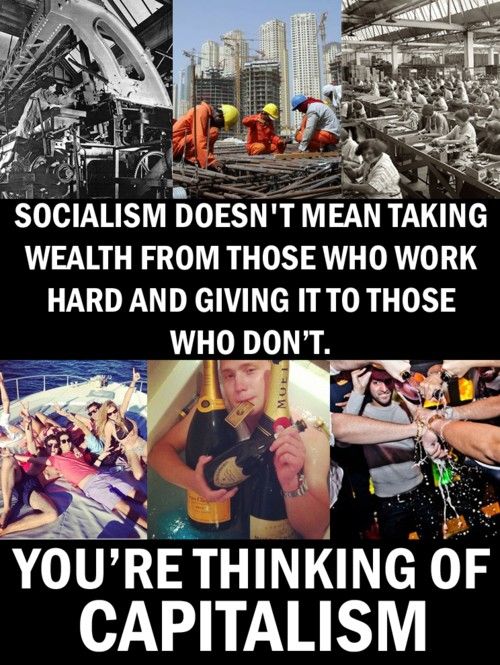 One of the most common arguments against the establishment of Anarchist Socialism is that there would be no incentive to work in a new, future society - leading to widespread apathy and laziness among the general population, with a few carrying the burden of the overwhelming majority at best and at worst nothing will be done at all. The aim of this piece is to highlight that the opposite is instead true - that in a socialist society there will even more of an incentive to work productively (in the capitalist sense) and to contribute to the communal pot which we can all then draw from.
One of the most common arguments against the establishment of Anarchist Socialism is that there would be no incentive to work in a new, future society - leading to widespread apathy and laziness among the general population, with a few carrying the burden of the overwhelming majority at best and at worst nothing will be done at all. The aim of this piece is to highlight that the opposite is instead true - that in a socialist society there will even more of an incentive to work productively (in the capitalist sense) and to contribute to the communal pot which we can all then draw from.
Firstly we should reject the capitalist ethos of what is productive labour. To summarise under capitalism productive labour is valued by how much profit can be made in a transaction of goods, services or ficticous capital - not by how valuable it is on a human level. Take for instance stock brokers who get enormous pay checks for betting on and moving currency or goods around the world, while mothers and the care givers of children get next to nothing, becoming slaves to charity, the state or their partners (possible all of these) to support them in the rearing and socialisation of children, so arguably one of the most important jobs in society gets no remuneration.
Thoughts on Squatting & Social Centers
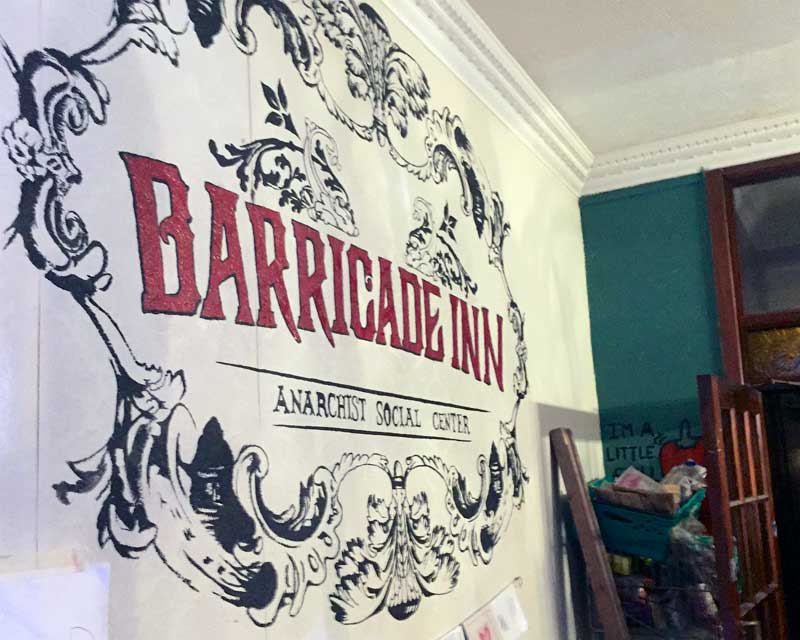 Over the previous year myself and a small number of comrades have been involved in housing activism in Dublin, specifically in relation using squatting or using occupation as a tactic. This is meant to be a short piece on some of the lessons learnt to inform activists who wish to get involved in this sort activity.
Over the previous year myself and a small number of comrades have been involved in housing activism in Dublin, specifically in relation using squatting or using occupation as a tactic. This is meant to be a short piece on some of the lessons learnt to inform activists who wish to get involved in this sort activity.
At the start of our career as squatter/housing activists over a year ago occupying buildings seemed like the primary logical option available to us. Not only was it an available and sensible form of direct action, which informed by our Social Anarchist politics was invariable the best and most effective tactic to use, it was also an easy way to alleviate the housing crisis.
What is 'Self-Organisation'? A Basic Introduction
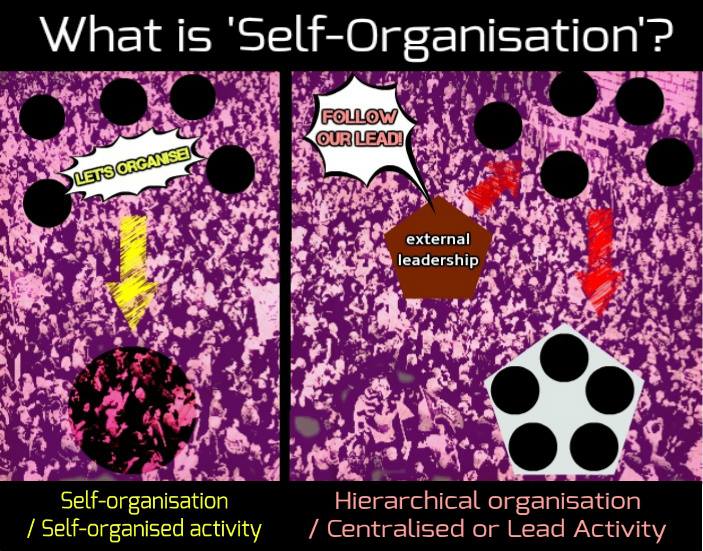 What is 'self-organisation'?
What is 'self-organisation'?
Listen to anarchists for long enough, and you'll hear us praising the 'self-organisation' of various movements or groups and insisting that political activity needs to be more 'self-organised'. But what does this mean? Why is this important?
It can be an odd-sounding term, but basically 'self-organisation' is doing stuff without relying on or waiting for external leadership or a central authority. A 'self-organised' movement doesn't wait for parties, unions, or whatever leader, to give it orders. A 'self-organised' group isn't controlled from the top-down. Self-organisation – like a related idea, 'self-management' – is at the core of anarchism. It makes us more effective, and gives us an opportunity to practice real democracy.
Nuit Debout - the failure of parliamentary politics in France
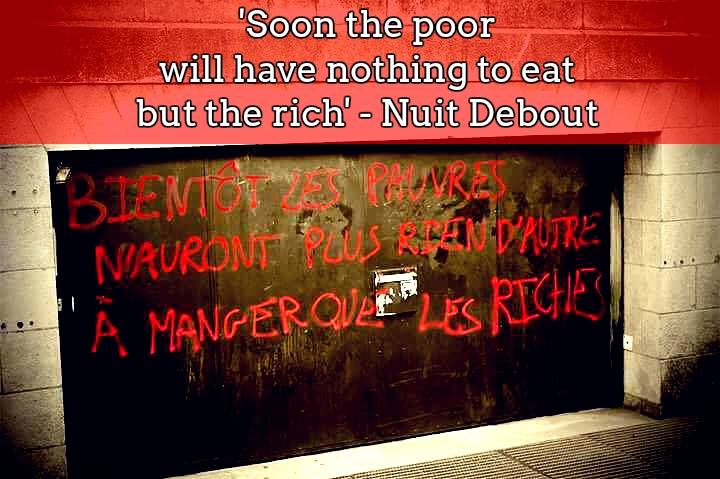 Since the worldwide recession in 2008, we have seen governments around the world make neoliberal reforms, states hammering through austerity measures. In Ireland we know only too well the extent of austerity, the state has cut everything from healthcare to social housing. We have seen the struggle communities have been fighting against the privatization of water. We have seen the ever rising number of people being made homeless, mothers and fathers having to sleep in cars and parks with their children. We have seen massive unemployment, our loved ones having to emigrate to the other side of the world to find work.
Since the worldwide recession in 2008, we have seen governments around the world make neoliberal reforms, states hammering through austerity measures. In Ireland we know only too well the extent of austerity, the state has cut everything from healthcare to social housing. We have seen the struggle communities have been fighting against the privatization of water. We have seen the ever rising number of people being made homeless, mothers and fathers having to sleep in cars and parks with their children. We have seen massive unemployment, our loved ones having to emigrate to the other side of the world to find work.
Making sense of the Brexit tide of reaction and the reality of the racist vote
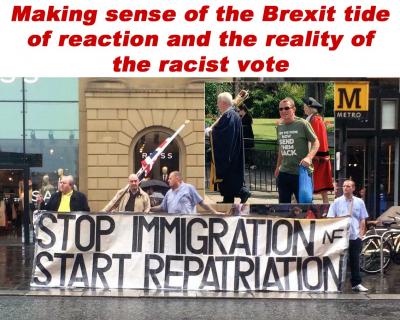 The Leave / Brexit vote in the referendum came in the end as a surprise, a narrow win for Remain was expected. This may be because the core Leave vote was in the run-down white working class communities of the now desolate English and Welsh industrial zones. A population trapped in conditions of long-term unemployment and poverty who no one really pays much attention to anymore.
The Leave / Brexit vote in the referendum came in the end as a surprise, a narrow win for Remain was expected. This may be because the core Leave vote was in the run-down white working class communities of the now desolate English and Welsh industrial zones. A population trapped in conditions of long-term unemployment and poverty who no one really pays much attention to anymore.
Some on the left have seized on the makeup of this core vote to suggest that there was some progressive element to the Brexit vote despite the campaign being led by racist hatemongers and wealthy US-oriented neoliberals. Mostly that’s a mixture of wishful thinking and post hoc justification for having called for a Leave vote in the first place, but it is true that a section of the working class, C2DEs in marketing speak, voted to Leave in close to a 2:1 ratio. Is the class composition of that vote enough to automatically make it progressive regardless of content? And what does it tell us that a section of the radical left seems to think the answer to that question is yes, that it is enough to be anti-establishment?
10 point guide for post Brexit resistance as racist right wins EU referendum
1. The Brexit vote for the UK to leave the European Union demonstrates that even weak parliamentary democracy is incompatible with escalating neoliberal inequality. In the UK as elsewhere a tiny segment of the population have taken a larger and larger share of total wealth in the last decades. Particularly under austerity almost everyone else has seen their share of the wealth they produce decline massively.
2. The Remain campaign was headed up by the political class of the neoliberal establishment and backed by model neo liberal corporations like Ryanair. But because the anger against rising inequality was successfully diverted through scapegoating already marginalized people, in particular migrants, the Leave campaign was also lead by wealthy elitist bigots whose variant of neoliberalism looks to the former colonies and the US rather than Europe.

